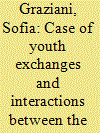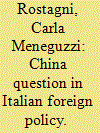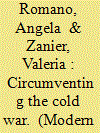|
|
|
Sort Order |
|
|
|
Items / Page
|
|
|
|
|
|
|
| Srl | Item |
| 1 |
ID:
151635


|
|
|
|
|
| Summary/Abstract |
Soon after the founding of the People's Republic of China (PRC), youth exchanges came to be a major part of the Chinese campaign to reach out and influence the people of other nations. Despite the growing scholarly discussion regarding the role of people-to-people diplomacy and external propaganda in China's foreign policy, so far no direct attention has been paid to the Chinese Communist Party's efforts to institutionalize youth exchanges and use them as a tool to promote the new Chinese government's foreign relations. This article locates the position of young people within the PRC's people-to-people diplomacy. It attempts to explore youth exchanges with the West in the early years of the Cold War by focusing on relations between Italian and Chinese youth groups in the 1950s. Relying mainly on unexplored archival material and memoirs, this article documents contacts and exchanges between adult-led youth organizations and their members, and shows how Italian left-wing party-affiliated youth groups and Soviet-dominated transnational organizations provided important channels for Sino-Italian encounters and for building long-lasting contacts among potential future leaders of these countries.
|
|
|
|
|
|
|
|
|
|
|
|
|
|
|
|
| 2 |
ID:
151631


|
|
|
|
|
| Summary/Abstract |
Relying on evidence from the Italian Ministry of Foreign Affairs and on the private archives of both Aldo Moro and Pietro Nenni, this article shows that from the mid-1950s onwards, important politicians—Socialist Pietro Nenni, Christian Democrat Giovanni Gronchi and Liberal Gaetano Martino—worked to encourage economic exchanges between Italy and China, and were linked with the concurrent initiatives of economic actors like Dino Gentili and Enrico Mattei. It also reveals that this gradual but steady process placed the China question firmly on the agenda of Italian parliamentary debates and government programmes as early as 1964. Finally, it shows that, while American diplomacy was still dominated by the Vietnam War and opposed any initiative towards Chinese recognition, in 1969–1970 the long process of rapprochement between Rome and Beijing came to an end. Thanks to Nenni's and Moro's diplomatic action, Italy recognized the People's Republic of China (PRC) before the Americans decided to inaugurate triangular diplomacy and reach out to China.
|
|
|
|
|
|
|
|
|
|
|
|
|
|
|
|
| 3 |
ID:
151634


|
|
|
|
|
| Summary/Abstract |
After 1955 the People's Republic of China looked to Western Europe to develop new economic and cultural relations, and to project its new image as an independent Socialist state. In this new context, between 1955 and 1957 several Italian delegations visited China to explore the possibility of cooperation between China and Italy in the field of literature and art. This article investigates the most important of these delegations, led by the jurist, Piero Calamandrei, in 1955, and some subsequent initiatives, such as the exhibition of Italian artists held in Beijing in 1956. Drawing mainly from Italian published and private sources, the article explores how Socialist China's revolutionary cultural identity was understood and received in Italy in this period. It does so with special reference to the impact of Soviet cultural influence on China, and the prospect of Sino-Italian cooperation in the field of arts and literature as a way to bridge the East–West political and ideological divide.
|
|
|
|
|
|
|
|
|
|
|
|
|
|
|
|
| 4 |
ID:
151626


|
|
|
|
|
| Summary/Abstract |
This special issue brings together historians with expertise on China and Western Europe who have the explicit intent of bridging the existing gap between two parallel strands of scholarship, that is, Europe in the Cold War and the history of Socialist China, and combining the different perspectives and approaches of international, diplomatic, business, and cultural historiographies. The contributors’ lively interaction and close collaboration has been the key to the conceptual development of a broader view of the relations between West European countries and Socialist China in the early decades of the Cold War, as well as of China's policy towards the capitalist world before the Reform and Opening era.
|
|
|
|
|
|
|
|
|
|
|
|
|
|
|
|
| 5 |
ID:
151633


|
|
|
|
|
| Summary/Abstract |
This article explores the relationship between Chinese officials and Western European industrialists, revealing that in the second half of the 1950s, there already was a specific Western European interest in China's market potential, and that this was met with favour on the Chinese side. In order to become a strong and independent country, the People's Republic of China was especially interested in evaluating a wide range of offers in the chemical and energy sectors. By looking at the early achievements of the Italian company, National Hydrocarbon Holding (Ente Nazionale Idrocarburi, ENI), this article will show how its offer in terms of technology and engineering met with the favour of the Chinese at the beginning of the 1960s. This was just when the local petroleum industry was moving towards self-reliance, which China ultimately achieved, albeit for a short time. Sources show that, despite economic and political constraints, PRC decision-makers were perfectly aware of prices and commercial strategies, as well as of the state-of-the-art technology of the time. Furthermore, China's commercial cooperation with Western European companies in the 1950s–1960s meant that early on Chinese leaders had an opportunity to evaluate market alternatives to their tightly constraining alliance with the Socialist bloc.
|
|
|
|
|
|
|
|
|
|
|
|
|
|
|
|
| 6 |
ID:
151627


|
|
|
|
|
| Summary/Abstract |
This article aims to deepen scholarly understanding of the special political and economic connection between Britain and Socialist China during the 1950s and the 1960s. After 1949, the British government had substantive reasons to preserve a link with Beijing, despite the unfolding of the Cold War. First, British assets in China were numerous. Second, the Crown colony of Hong Kong was an indispensable strategic enclave, although militarily indefensible. Third, the Foreign Office considered that Asia should represent an exception to unquestioned British loyalty to the Atlantic alliance, since the United Kingdom needed to prove that it was able to represent and preserve Commonwealth interests in the area. The article will point out that the United Kingdom maintained a privileged role as the main trading partner of the People's Republic of China (PRC) outside the Socialist bloc, thanks to the financial and commercial role played by Hong Kong. This is proved through an analysis of the fate of British financial institutions in China, which represented a favourable exception in the bleak scenario of the PRC nationalization process, as well as of the industrial development of the British colony, which was based on importing food and labour from the mainland, while serving as a financial hub in support of the PRC economy.
|
|
|
|
|
|
|
|
|
|
|
|
|
|
|
|
| 7 |
ID:
151630


|
|
|
|
|
| Summary/Abstract |
This article focuses on the interplay between the political authorities and economic actors in the Federal Republic of Germany in the process of establishing relations with the People's Republic of China after 1949. Within this framework, the article will assess the role played by the Ost-Ausschuss der Deutschen Wirtschaft (Eastern Committee of German Economy), a semi-official organization recognized by the West German government. Both the ability of German economic actors and China's urgent need for economic contact with the West caused German-Chinese trade relations to circumvent the strict non-recognition policy followed by the West German government. The article also argues that, while economic relations heralded official recognition of the People's Republic of China by other Western European countries, in the case of the Federal Republic of Germany a division between the two spheres was finally accepted by the major actors involved, and ended only after the change of attitude imparted by the Nixon presidency in the United States during the early 1970s.
|
|
|
|
|
|
|
|
|
|
|
|
|
|
|
|
| 8 |
ID:
151629


|
|
|
|
|
| Summary/Abstract |
This article focuses on France's policy towards Socialist China in the decade preceding the spectacular and well-studied decision by President Charles de Gaulle to officially recognize the People's Republic of China (PRC). It argues that since the mid-1950s successive French governments discreetly orchestrated a process of rapprochement with the Communist authorities in Beijing. The article demonstrates that, at a time when the international situation discouraged steps towards official relations, the French government used commercial diplomacy as a means to open unofficial diplomatic channels with the Chinese and prepare the ground for future recognition. Relying mostly on French archival sources, this article brings to light evidence of the evolution of French diplomacy's thinking about Socialist China and assesses the rationales behind the French government's growing determination to normalize relations with it. It argues that the intensifying contest among European countries to reach out to Beijing, concerns about the PRC's appeal to developing countries, and an early appraisal of Sino-Soviet rivalry prompted French authorities to work for Sino-French rapprochement, while, at the same time, annoyance at the White House's obstinate refusal to revise its reading of Cold War dynamics weakened France's disposition to fall into line with American demands to maintain a harsh stance towards the PRC.
|
|
|
|
|
|
|
|
|
|
|
|
|
|
|
|
|
|
|
|
|